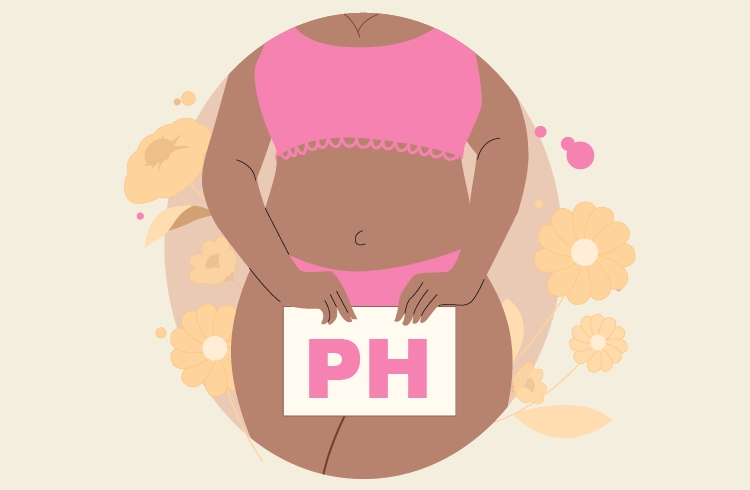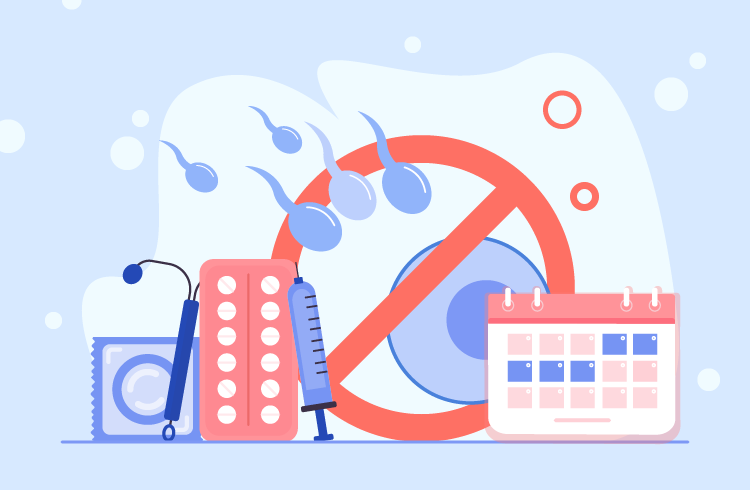What are hormones?
Hormones are specialised substances that regulate key bodily functions, acting as powerful signals between different parts of the body. They control a wide range of processes, from growth and development to metabolism and reproduction. Hormones essentially serve as the body's internal communication system, ensuring that every system and organ functions in harmony.
Types of Hormones in Women
In women, there is a complex interplay of hormones that control various aspects of their reproductive health. Here are some of the key hormones that play pivotal roles:

1. Oestrogen:
This hormone, produced primarily in the ovaries, is responsible for the development of female secondary sexual characteristics, regulation of the menstrual cycle, and the thickening of the uterine lining to support pregnancy.
2. Progesterone:
Also produced in the ovaries, progesterone helps prepare the uterine lining for implantation and supports early pregnancy.
3. Follicle-Stimulating Hormone (FSH):
FSH prompts the ovaries to produce mature eggs during the menstrual cycle.
4. Luteinizing Hormone (LH):
LH triggers ovulation, releasing a mature egg from the ovary.
Related product: Track LH to pinpoint your most fertile days with IVY103 Ovulation tracker
5. Prolactin:
This hormone, produced by the pituitary gland, stimulates milk production in breastfeeding women.
6. Thyroid Hormones (T3 and T4):
Produced by the thyroid gland, these hormones regulate metabolism and can influence menstrual regularity.
7. Gonadotropin-Releasing Hormone (GnRH):
Released by the hypothalamus, GnRH signals the pituitary gland to produce FSH and LH.
These hormones work in a delicate balance, and any disruption can affect egg quality, ovulation, and overall fertility. Understanding how these hormones interact is crucial for women planning to conceive and maintain their reproductive health.
The Importance of Hormonal Balance
1. Increases fertility and high egg quality
 Hormones play a major role for women in fertility support and menstrual cycle regulation. A regular and predictable menstrual cycle, a fundamental sign of reproductive health, depends on hormonal balance. Ovulation, or the release of a mature egg from the ovaries each month, is ensured when hormones are in balance.
Hormones play a major role for women in fertility support and menstrual cycle regulation. A regular and predictable menstrual cycle, a fundamental sign of reproductive health, depends on hormonal balance. Ovulation, or the release of a mature egg from the ovaries each month, is ensured when hormones are in balance.
For a pregnancy to be a success, high-quality eggs are essential. Oestrogen and progesterone in particular play important roles in the maturation and development of eggs. Healthy, mature eggs are produced more readily in a hormonally balanced environment, which improves the likelihood of successful fertilisation and implantation.
2. Supports a healthy pregnancy
In women, hormones play a major role in fertility support and menstrual cycle regulation. A regular and predictable menstrual cycle, a fundamental sign of reproductive health, depends on hormonal balance. Ovulation, or the release of a mature egg from the ovaries each month, is ensured when hormones are in balance.
For a pregnancy to be a success, high-quality eggs are essential. Oestrogen and progesterone in particular play important roles in the maturation and development of eggs. Healthy, mature eggs are produced more readily in a hormonally balanced environment, which improves the likelihood of successful fertilisation and implantation.
3. Improves immunity and overal health
The immune system, which is vital for safeguarding both the mother and the growing foetus, is greatly influenced by hormones. A healthy hormonal environment supports a strong immune system, protecting against infections and other health risks.
Additionally, hormonal equilibrium supports general health. Among other things, hormones have an impact on the health of the skin, heart, and bones. Balanced hormones can improve a woman's overall quality of life by lowering her risk of diseases like osteoporosis and heart disease.
4. Decreases the risk of mood problems
 It is obvious hormones have an effect on mood. Hormonal fluctuations, such as those brought on by the menstrual cycle or pregnancy, can cause mood swings, irritation, and even depression. Mood problems can also be a result of hormonal imbalances, particularly those involving thyroid hormones.
It is obvious hormones have an effect on mood. Hormonal fluctuations, such as those brought on by the menstrual cycle or pregnancy, can cause mood swings, irritation, and even depression. Mood problems can also be a result of hormonal imbalances, particularly those involving thyroid hormones.
Stabilising mood and emotional well-being requires achieving hormonal balance. Better relationships and a higher standard of living may result from this.
In conclusion, hormonal balance is essential to a woman's health since it affects everything from her mood to her immune system to the outcome of her pregnancy. Women who are aware of the significance of hormonal balance are more equipped to take proactive measures to optimise their hormone levels, which will ultimately lead to a happier and more satisfying existence.
What to do if you have imbalanced hormones?
Discovering that your hormones are out of balance can be unsettling, but there are proactive steps you can take to restore hormonal equilibrium and enhance your overall well-being.

1. Embrace a Healthy Diet
The foundation of hormonal harmony is a nutritious, well-balanced diet. Include a variety of fresh produce, whole grains, lean proteins, and healthy fats in your meals. These foods provide essential vitamins and minerals crucial for promoting healthy hormone balance and reproductive health. Pay special attention to sources of antioxidants, vitamins, and minerals as they are vital for maintaining hormonal equilibrium.
2. Maintain a Regular Exercise Routine
Regular physical activity significantly impacts hormonal health. Exercise not only aids in weight management but also contributes to hormone regulation. Aim for at least 150 minutes of moderate-intensity aerobic activity or 75 minutes of vigorous-intensity aerobic activity per week, complemented by two or more days of muscle-strengthening activities.
3. Consider Inositol for Hormone Balance
Inositol, a naturally occurring substance found in various foods and supplements, has garnered attention for its ability to restore hormonal balance, especially in conditions like polycystic ovarian syndrome (PCOS). Inositol supplementation can promote ovarian function, regulate menstrual cycles, and enhance insulin sensitivity.
Femometer's Women's Multivitamin contains vitamins and minerals that can assist hormonal balance in addition to other necessary components to support your general health.
Or you could consider Evening Primrose Oil by Femometer an additional item that can support hormonal harmony and general wellbeing.
Always speak with your doctor before adding any new supplements to your regimen to make sure they meet your individual requirements.
Related product: Myo & D-Chiro 40:1 Inositol, Women's Multivitamin, Evening Primrose Oil
4. Incorporate Meditation
Incorporating stress-reduction practices like meditation into your daily routine can be highly beneficial since stress can disrupt hormonal equilibrium. Meditation fosters a more balanced hormonal state by reducing stress hormones such as cortisol. Just a few minutes of daily mindfulness practice can significantly reduce the impact of stress on your hormones.
5. Prioritise Quality Sleep
For overall health and hormonal balance, prioritise getting a good night's sleep. Aim for 7-9 hours of quality sleep each night. Create a sleep-conducive environment by keeping your bedroom dark, quiet, and at a comfortable temperature. Establishing a consistent sleep schedule can help regulate your body's internal clock.
Incorporating these lifestyle adjustments can benefit your hormonal balance and overall well-being. It's important to remember that hormonal imbalances can be complex and may require specialised care. If you suspect you have a hormone imbalance or if your symptoms persist, consult a healthcare professional. They can conduct hormone tests and create a tailored plan to meet your unique hormonal needs. With the right approach, you can regain control of your hormonal health and enjoy a healthier, more balanced life.
This article is the original creation of Femometer. All rights reserved by Femometer Inc. To reproduce, distribute, or reference the content, please reach out to us in advance to prevent any potential legal issues. Copyright © Femometer Inc.










